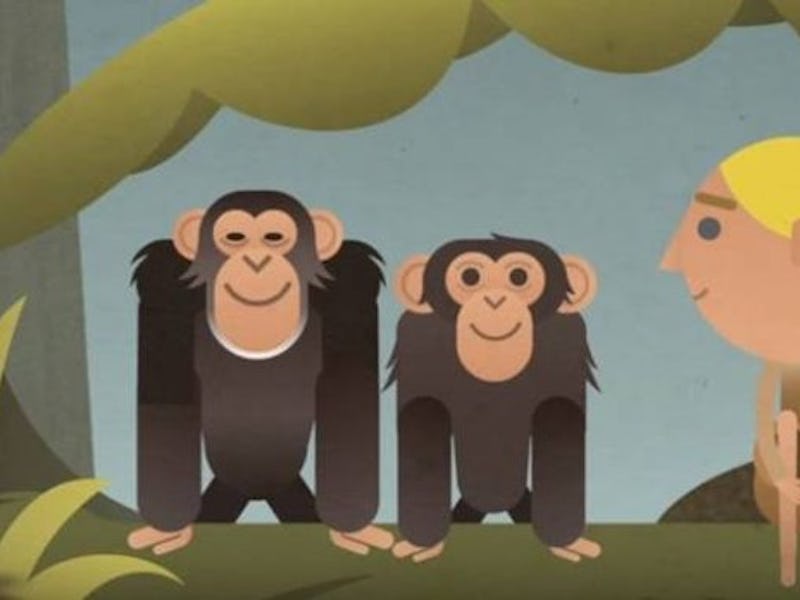Earth Day 2018: 6 Quotes from Jane Goodall on Conservation
After decades of activism, she has a few thoughts.

To celebrate Earth Day, Google teamed up with legendary primatologist Dr. Jane Goodall to reflect on the continued need for conservation. Goodall’s has worked in the field since the Sixties, and over the decades has shared keen insights on what’s missing from environmental efforts.
Earth Day first began on April 22, 1970, when 20 million people protested the negative effects of industrialization. For most, it’s an annual reminder of how much still needs to be done to reverse humanity’s destruction of the environment, and is observed through demonstrations and events held worldwide.
For scientists, however, Earth Day is becoming annual report card. The day marks the two year anniversary of the signing of the Paris Agreement and has since become an annual day for researchers to assess the progress since its signing and address ongoing challenges.
For decades, Goodall has discussed the need for heightened conservation efforts and has insisted that every little bit counts, from the shopping bags at grocery stores to government policy.
1. She holds politicians accountable.
Goodall has a lengthy history of advocating for animal welfare. That work led her to become an activist for several environmental causes, citing the connection between the destruction of the ecosystem and the health of those living in it. She has condemned politicians for ignoring the signs of climate change.
“I think my message to the politicians who have within their power the ability to make change is, ‘Do you really, really not care about the future of your great-grandchildren? Because if we let the world continue to be destroyed the way we are now, what’s the world going to be like for your great-grandchildren?”
2. Success depends on young people.
Goodall continues to work with younger activists to ensure that the next generations find ways to live more harmoniously with the environment.
“My mission is to create a world where we can live in harmony with nature. And can I do that alone? No. So there is a whole army of youth that can do it. So I suppose my mission is to reach as many of those young people as I can through my own efforts.”
3. Be mindful of each step.
To enact better policy, we have to be more aware of our own environmental impact. Goodall’s thoughts on this were quoted in Going Blue: A Teen Guide to Saving Our Oceans, Lakes, Rivers, & Wetlands written by Cathryn Berger Kaye and Philippe Cousteau. Innovation could lead to smaller carbon footprints but only if we first acknowledge the problems, Goodall insists.
“The most important thing is to actually think about what you do. To become aware and actually think about the effect of what you do on the environment and on society. That’s key, and that underlies everything else.”
4. We might not be the smartest.
In an interview with Discover Magazine in 2007, Virginia Morell asked Goodall, “If chimps are so much like us, why are they endangered while humans dominate the globe?” Goodall made a case for a new way to assess an animal’s intelligence.
“Well, in some ways we’re not successful at all. We’re destroying our home. That’s not a bit successful. Chimpanzees, gorillas, orangutans have been living for hundreds of thousands of years in their forest, living fantastic lives, never overpopulating, never destroying the forest. I would say that they have been in a way more successful than us as far as being in harmony with the environment.”
5. We have to change how we produce food.
In her book, Harvest for Hope: A Guide to Mindful Eating Goodall urges readers to reevaluate how we produce and consume food.
“If the factory farm does indeed unravel — and it must — then there is hope that we can, gradually, reverse the environmental damage it has caused. Once the animal feed operations have gone and livestock are once again able to graze, there will be a massive reduction in the agricultural chemicals currently used to grow grain for animals. And eventually, the horrendous contamination caused by animal waste can be cleaned up.”
6. None of this will be easy.
In Harvest for Hope, Goodall understands that returning to a healthy environment might require fundamental changes in society, but that doesn’t mean activists can’t push for gradual improvements.
“None of this will be easy. The hardest part of returning to a truly healthy environment may be changing the current totally unsustainable heavy-meat-eating culture of increasing numbers of people around the world. But we must try. We must make a start, one by one.”